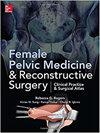Failure Rate of Retropubic Midurethral Sling With and Without Concomitant Robotic Sacrocolpopexy
IF 1.4
4区 医学
Q3 OBSTETRICS & GYNECOLOGY
Female Pelvic Medicine and Reconstructive Surgery
Pub Date : 2022-03-01
DOI:10.1097/SPV.0000000000001159
引用次数: 2
Abstract
Importance The retropubic midurethral sling (rMUS) and sacrocolpopexy are treatments for stress urinary incontinence (SUI) and pelvic organ prolapse, respectively, which are often performed concomitantly. Objective The purpose of this study was to identify whether a difference exists in the failure rates of rMUS when placed alone or at the time of robotic sacrocolpopexy (RSC). Study Design We conducted a single-center retrospective cohort study of patients who underwent rMUS placement between December 2015 and March 2020. The primary outcome was rMUS failure defined as additional treatment for SUI at any point. Results There were 160 patients who underwent isolated rMUS and 175 patients who underwent rMUS and RSC. Patients who underwent isolated rMUS were more likely to be obese (P < 0.01). Patients who underwent RSC were older (63.3 ± 9.9 vs 57.7 ± 13.7 years, P < 0.0001) and more likely to be White (P = 0.02). Follow-up ranged from 0 to 46 months (median, 3 months; interquartile range, 3 months). Failure was observed in 2.3% of rMUS placed alone and 8.6% of rMUS with RSC. Patients who underwent rMUS and RSC had an odds ratio of 3.63 for rMUS failure (P = 0.03; 95% confidence interval, 1.16–11.38). Hypertension was associated with 4 times higher rMUS failure (odds ratio, 4.18; P = 0.02; 95% confidence interval, 1.29–13.58). Conclusions We observed a significantly increased rate of rMUS failure from those placed alone to those placed at the time of RSC. Retropubic midurethral sling at the time of RSC was 4 times more likely to result in additional SUI treatment.带或不带机器人骶管切除术的耻骨后中尿道吊带的失败率
耻骨后尿道中悬吊术(rMUS)和骶colpop固定术分别是治疗压力性尿失禁(SUI)和盆腔器官脱垂的方法,两者通常同时进行。目的本研究的目的是确定单独放置或机器人骶colpop固定术(RSC)时rMUS的失败率是否存在差异。研究设计我们对2015年12月至2020年3月期间接受rMUS安置的患者进行了一项单中心回顾性队列研究。主要结局是rMUS失败,定义为在任何时候对SUI进行额外治疗。结果160例患者接受了孤立性rMUS, 175例患者同时接受了rMUS和RSC。接受孤立性rMUS的患者更容易发生肥胖(P < 0.01)。接受RSC的患者年龄更大(63.3±9.9岁vs 57.7±13.7岁,P < 0.0001),更可能是白人(P = 0.02)。随访时间为0 ~ 46个月(中位数为3个月;四分位数范围,3个月)。在单独放置的rMUS中,有2.3%的rMUS失败,在RSC中有8.6%的rMUS失败。接受rMUS和RSC的患者rMUS失败的优势比为3.63 (P = 0.03;95%置信区间为1.16-11.38)。高血压与rMUS失败率高4倍相关(优势比4.18;P = 0.02;95%置信区间为1.29-13.58)。结论:我们观察到单独放置的rMUS失败率明显高于RSC时放置的rMUS失败率。RSC时耻骨后中尿道吊带导致额外SUI治疗的可能性是RSC时的4倍。
本文章由计算机程序翻译,如有差异,请以英文原文为准。
求助全文
约1分钟内获得全文
求助全文
来源期刊

Female Pelvic Medicine and Reconstructive Surgery
OBSTETRICS & GYNECOLOGY-
CiteScore
2.10
自引率
12.50%
发文量
228
期刊介绍:
Female Pelvic Medicine & Reconstructive Surgery, official journal of the American Urogynecologic Society, is a peer-reviewed, multidisciplinary journal dedicated to specialists, physicians and allied health professionals concerned with prevention, diagnosis and treatment of female pelvic floor disorders. The journal publishes original clinical research, basic science research, education, scientific advances, case reports, scientific reviews, editorials and letters to the editor.
 求助内容:
求助内容: 应助结果提醒方式:
应助结果提醒方式:


